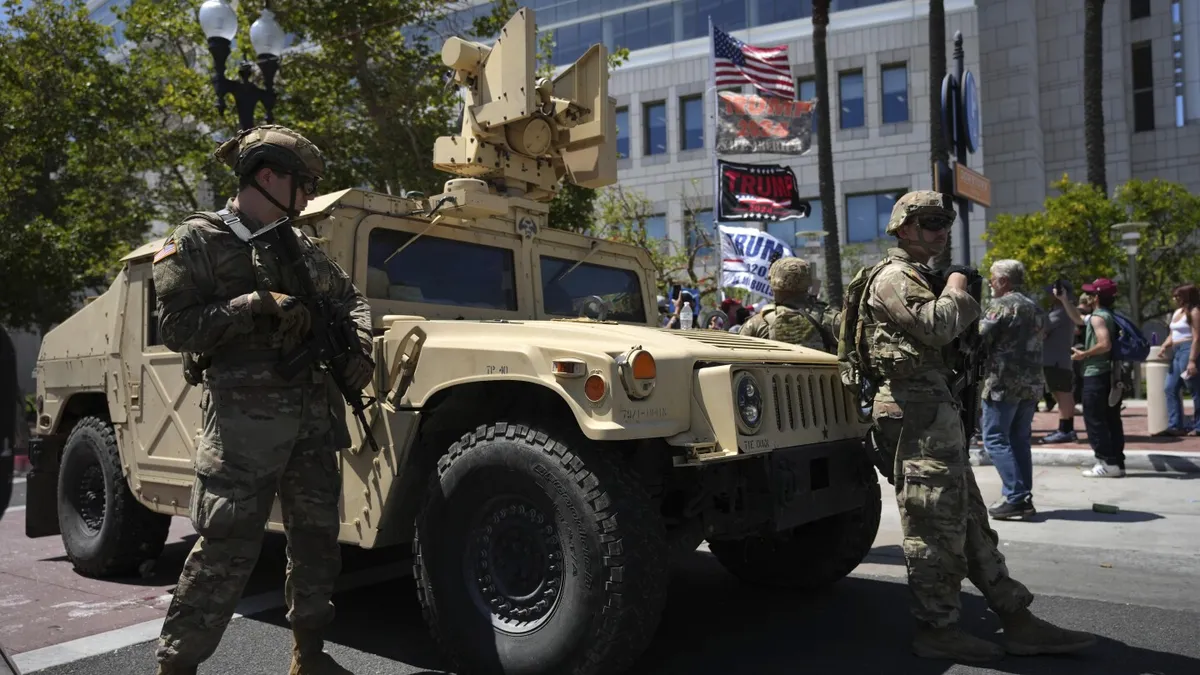
The Pentagon announced on Tuesday that it is concluding the deployment of 2,000 National Guard troops in Los Angeles, which accounted for nearly half of the military personnel sent to the city in response to protests against the Trump administration's immigration policies. This decision comes as approximately 4,000 National Guard soldiers and 700 Marines were stationed in the city since early June.
As of now, the reasons for the abrupt end to the 60-day deployment remain unclear. Moreover, it is uncertain how long the remaining troops will stay in the region. In late June, the commanding officer overseeing the troops in LA had requested Defense Secretary Pete Hegseth to return 200 of them to assist with wildfire fighting duties, as California Governor Gavin Newsom raised concerns about the understaffing of the Guard amid the peak wildfire season.
The end of the deployment follows a recent operation at MacArthur Park, where federal authorities and National Guard troops arrived with guns and horses. This operation concluded abruptly, and although the U.S. Department of Homeland Security did not clarify its purpose or confirm any arrests, local officials suggested it was intended to instill fear within the community.
Chief Pentagon spokesman Sean Parnell commented, “Thanks to our troops who stepped up to answer the call, the lawlessness in Los Angeles is subsiding.” This statement coincides with the backdrop of escalating protests that began on June 8, when thousands took to the streets in response to the deployment of the National Guard, resulting in significant confrontations with law enforcement.
During these protests, law enforcement utilized tear gas, rubber bullets, and flash bangs to manage the crowds. Notably, images surfaced showing several Waymo robotaxis set ablaze. The following day, police escalated their response in Little Tokyo, prompting bystanders and restaurant workers to flee the area.
In response to the unrest, Mayor Karen Bass imposed a curfew that lasted about a week, which she claimed was effective in protecting local businesses and restoring order. In recent weeks, the demonstrations in Los Angeles have been primarily smaller, spontaneous protests focused on individual arrests.
Mayor Bass expressed her approval of the troops’ withdrawal, stating, “This happened because the people of Los Angeles stood united and stood strong. We organized peaceful protests, we came together at rallies, we took the Trump administration to court—all of this led to today’s retreat.” She emphasized the ongoing commitment of the community, stating, “We will not stop making our voices heard until this ends, not just here in LA, but throughout our country.”
During a press conference, Bass criticized the National Guard's primary mission, which she argued was to guard two buildings that “frankly didn’t need to be guarded.” She expressed hope that this "experiment with the lives of people" would come to a close.
As of Tuesday afternoon, there was a notable absence of military presence outside the federal complex downtown, which had previously been a focal point for early protests. Initially, National Guard troops were deployed to protect federal buildings before Marines took over those responsibilities. Many of these soldiers have also been involved in immigration operations alongside federal agents.
President Donald Trump ordered the deployment despite Governor Newsom's opposition, leading to a legal battle. Newsom contended that the deployment was unlawful and violated the Posse Comitatus Act, which prohibits military involvement in civilian law enforcement on U.S. soil. While a federal judge initially ruled against the deployment, an appeals court later overturned that decision, leaving control of the troops with the federal government. A federal court is scheduled to hear arguments next month regarding whether the deployment violates the Posse Comitatus Act.
The initial deployment was set for 60 days, yet Defense Secretary Pete Hegseth had the authority to modify the duration based on the evolving circumstances. Following the Pentagon's recent announcement, Newsom stated that the deployment had disrupted the lives of the troops, turning them into “political pawns for the President.” He urged for an immediate end to the operation, stating that the remaining troops “continue without a mission, without direction, and without any hopes of returning to help their communities.”